Best puppy food: The finest chow for growing pups
Whether you’ve got a picky eater or a large breed, we’ve rounded up the vet-approved puppy foods for you
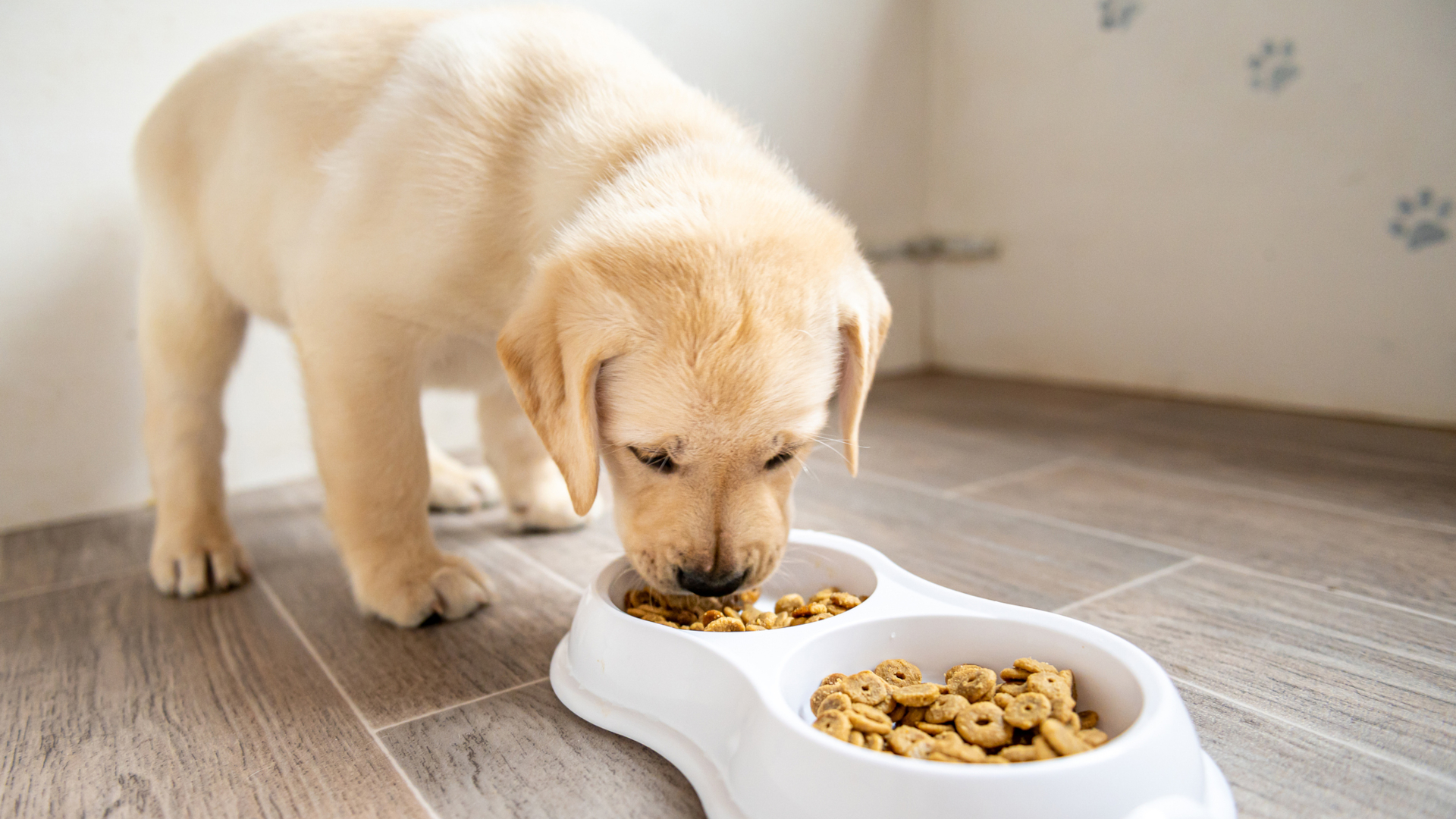
Help your adorable pup grow up big and strong with the best puppy food. Looking after a new puppy can be challenging, especially with so many brands claiming that they're the best choice. That's why we've consulted the experts to help you find the best puppy food for your little fluffball.
We spoke to expert vet Dr Lisa Coder to get her advice on which brands to choose, what ingredients to look for, and what to avoid. Wet food vs dry food is one of the big questions that we get asked, and there's no right answer. Dry puppy food is cheaper and easier to store, but wet food helps to keep your pup hydrated even when they're neglecting their water bowl.
You might think that puppies are just smaller dogs, so they should just be able to eat the best dog food, but it's not that simple. Young dogs need more calorie-dense meals than adult dogs — sometimes up to twice as much per meal – and they also need a different nutrient balance, with the Association of American Feed Control Officials (AAFCO) stating that puppies need a minimum of 22% protein and 8% fat.
As a general rule, you should start your pup on a puppy formula at approximately six weeks and continue it until they reach about a year old, then switch them to an adult formula. Check out our picks of the best dry dog food or the best wet dog food if your dog is reaching adulthood.
The Quick List
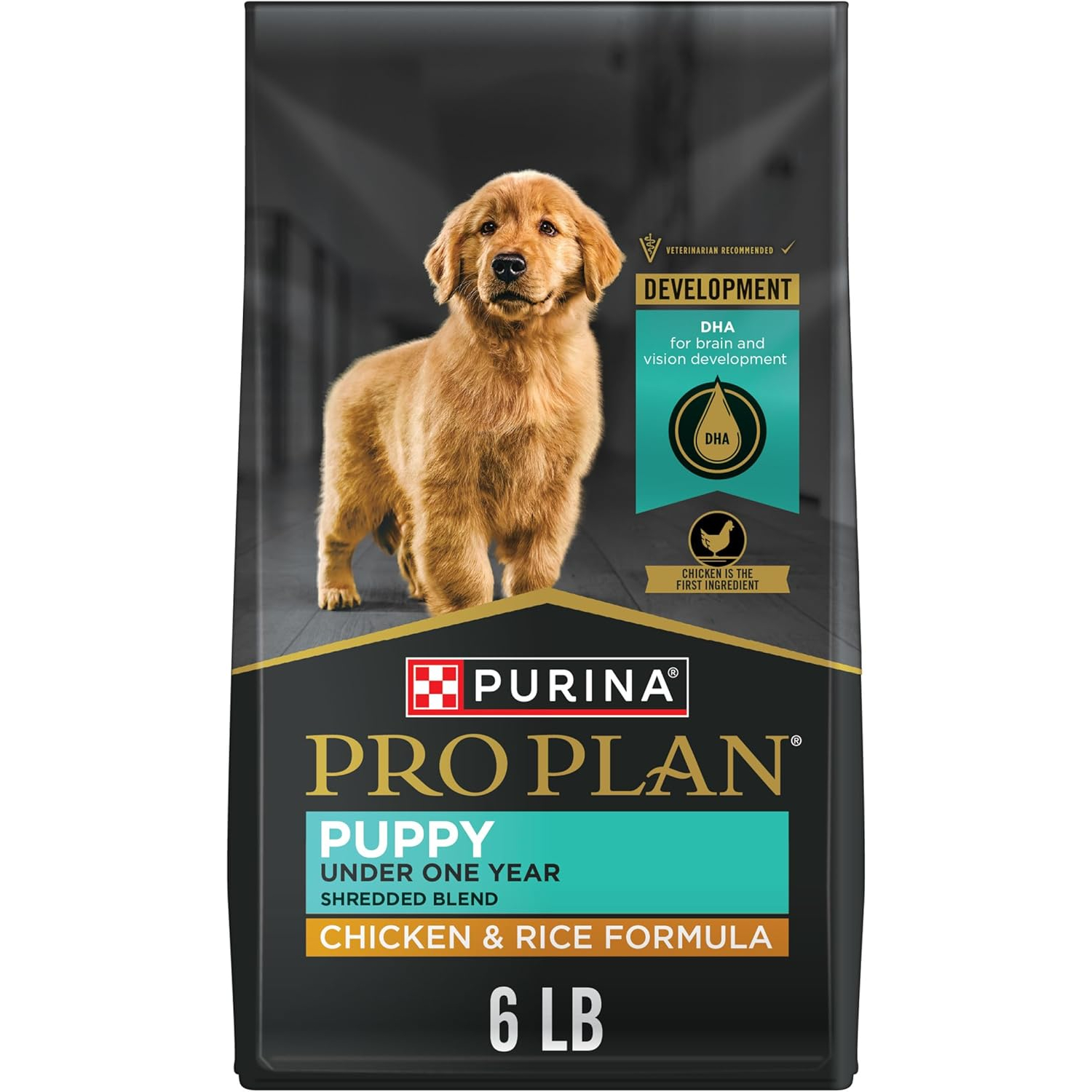
A tasty kibble that's easy to recommend to almost all puppies. It has chicken as the primary ingredient and comes packed with all the vitamins and minerals that your pooch needs to grow up strong. It's also very reasonably priced compared to other options out there.
Read more below
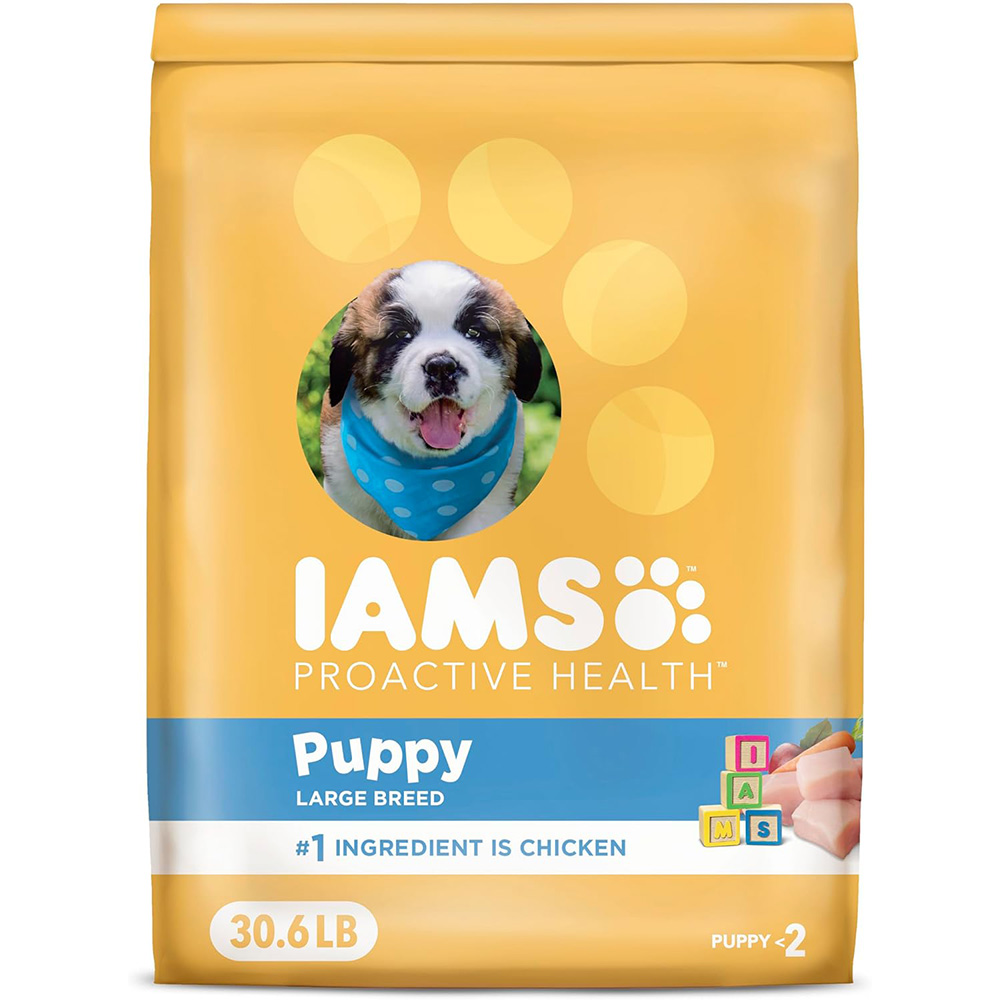
Specially formulated for larger dog breeds, this kibble helps ensure that they get all the protein they need, along with 22 nutrients found in their mother's milk, to support their rapid growth from tiny pup to hulking hound.
Read more below
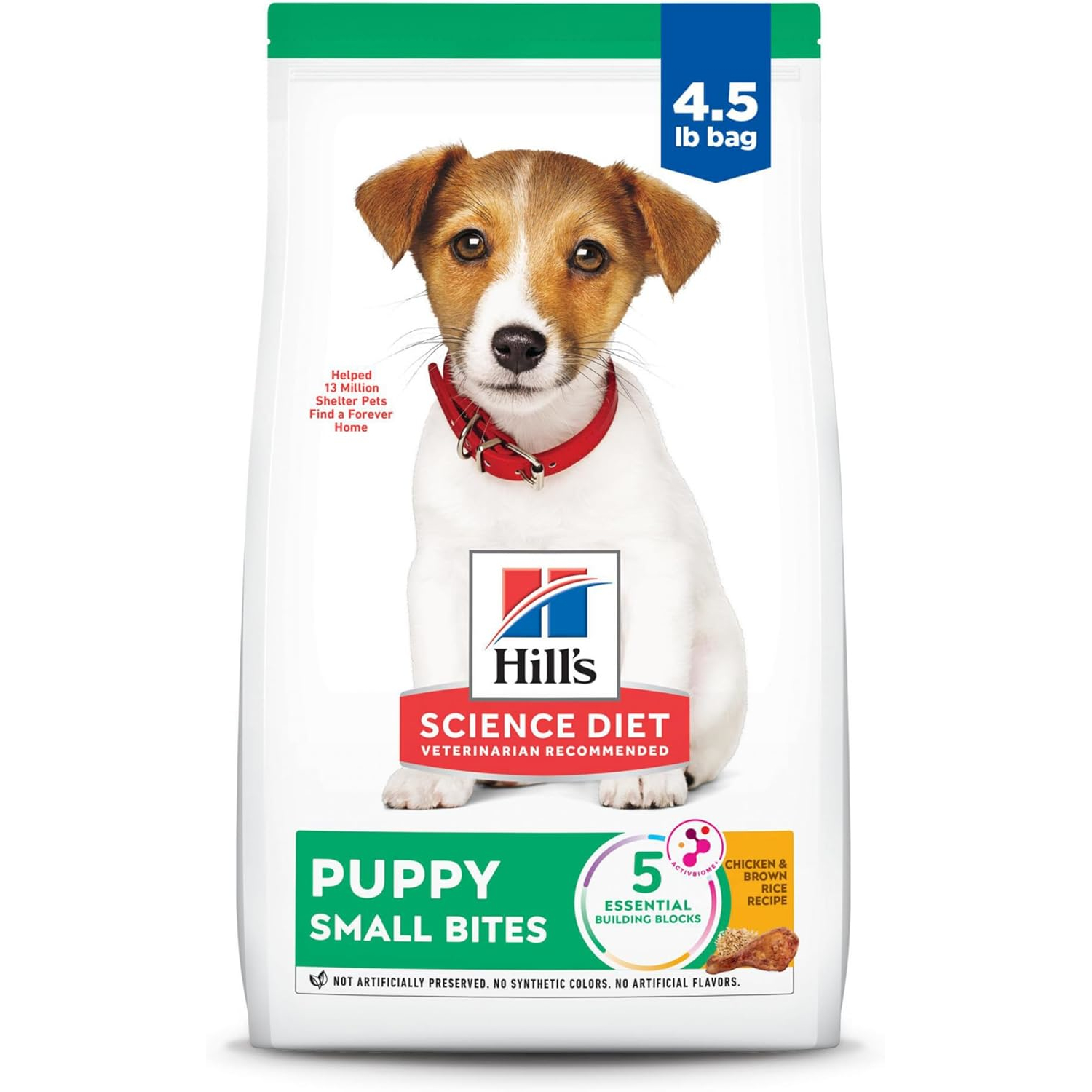
Sometimes, how the food is delivered is just as important as what's in it, and this kibble is just perfect for pint-sized dog breeds. The chunks are just 4–6.5mm across, making them easy for tiny pup breeds to get their teeth into. It's vet-approved and made in the USA.
Read more below
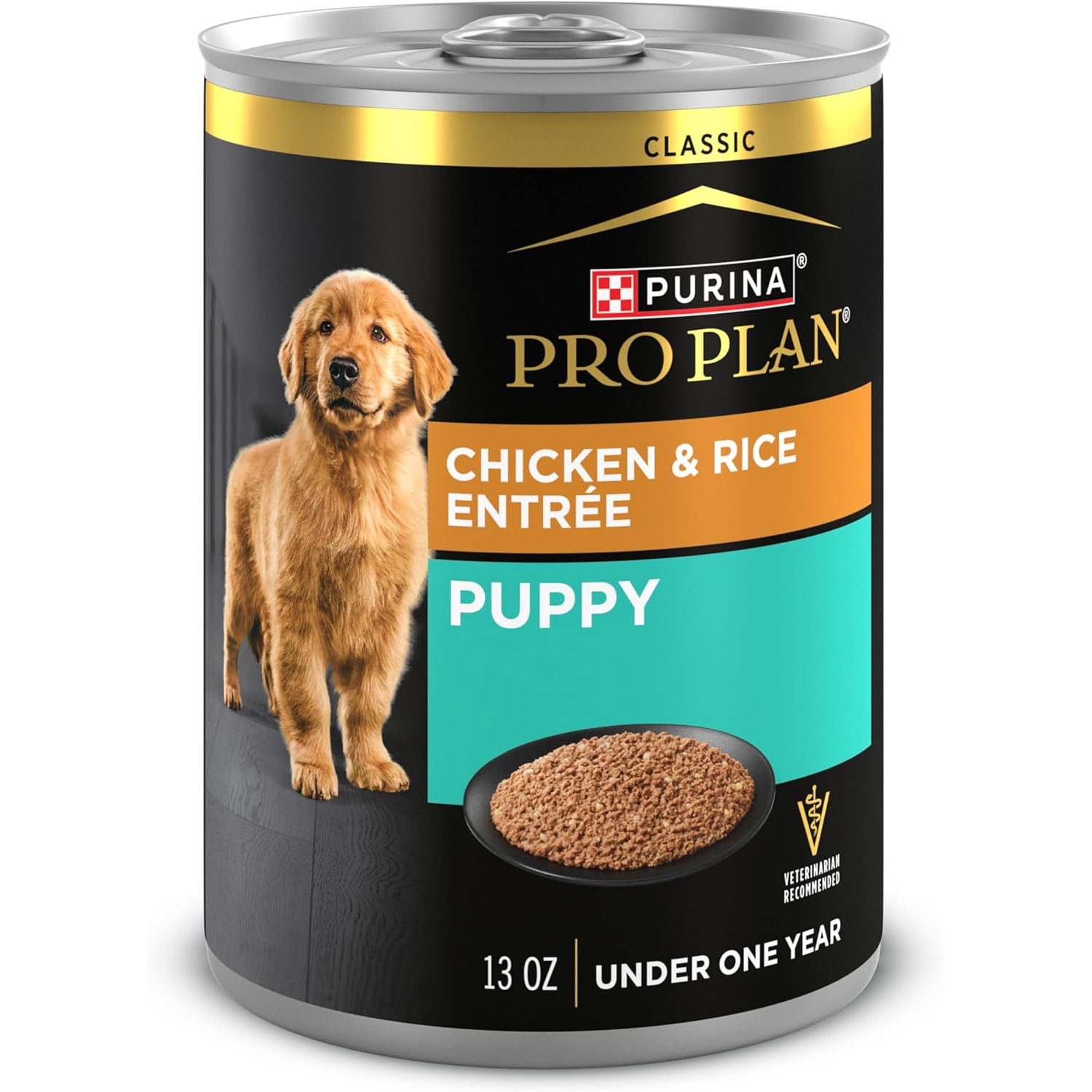
Some dogs just prefer the taste and texture of wet food – if your puppy is turning their adorable little nose up at kibble, try this healthy and tasty alternative from Purina. It comes in three flavors – chicken/rice, beef/rice, or turkey – uses the primary meat as the first ingredient, and contains no artificial colors, flavors, or preservatives.
Read more below
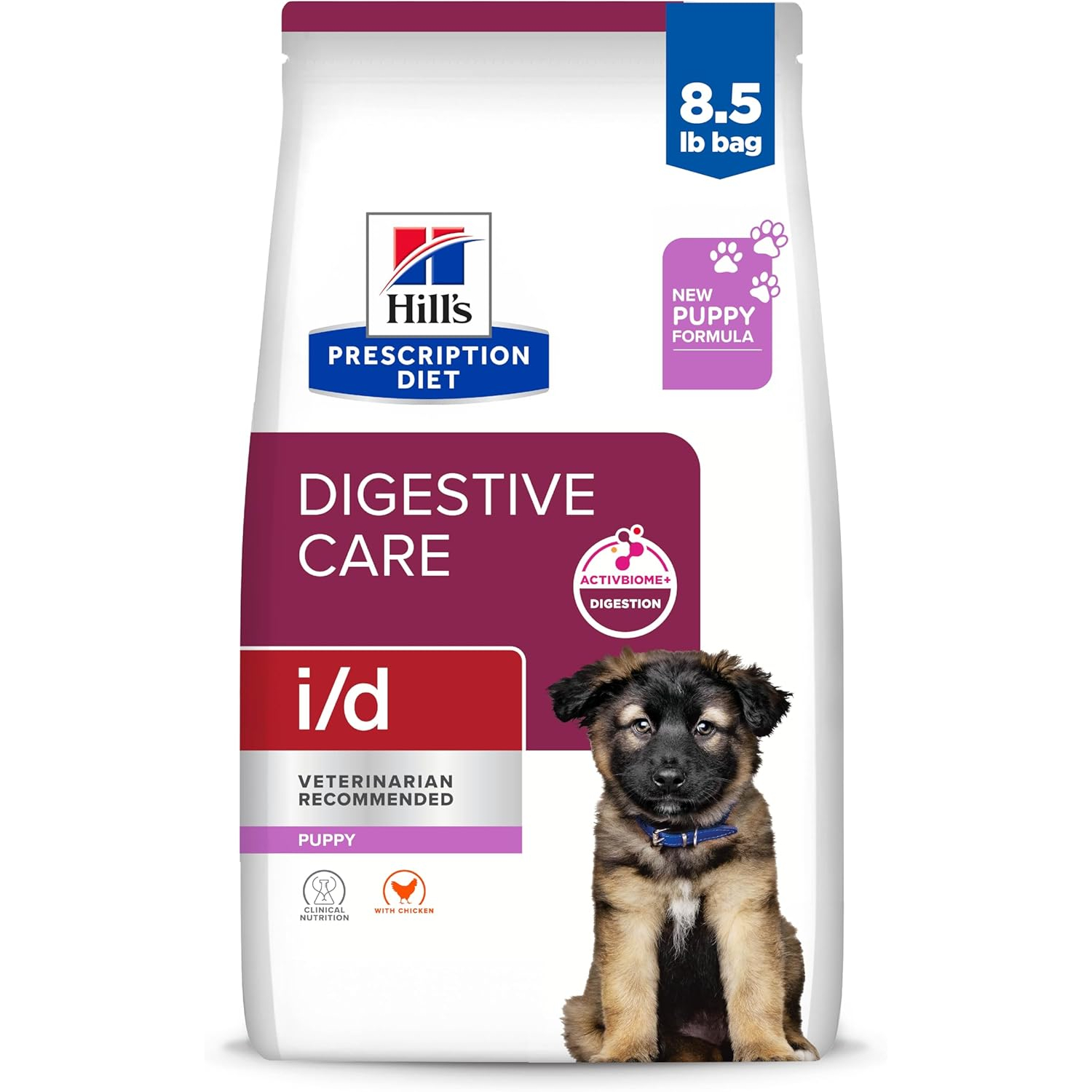
If your pup is suffering from digestive distress, then a specially-formulated diet may be the answer. This prescription kibble is designed to be highly digestible and easy on your pooch's gastrointestinal system, and includes a blend of prebiotic fibers to support their gut health.
Read more below
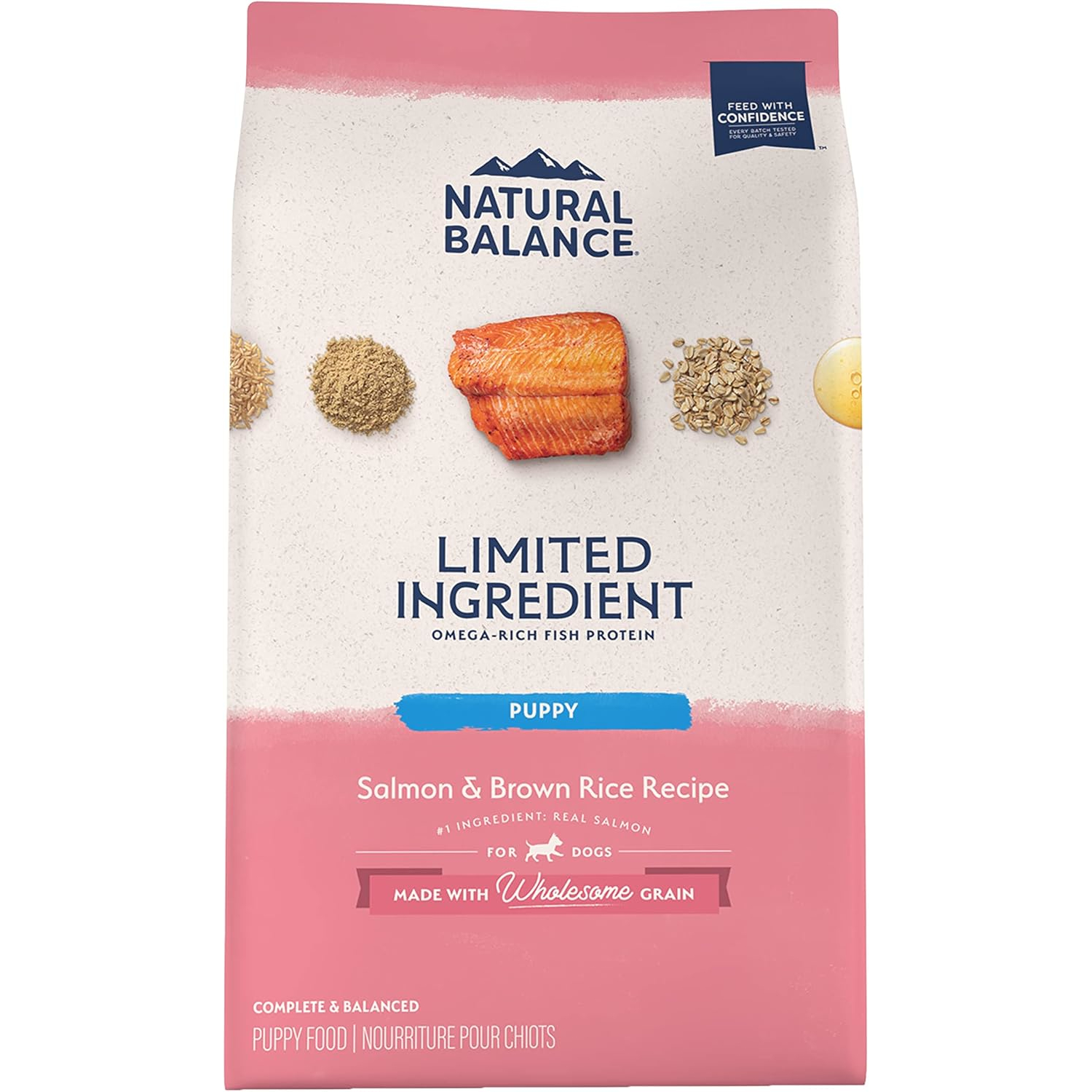
This limited-ingredient kibble skips out on many of the most common food allergens in dogs – including corn, wheat, and soy – while still keeping in some grains for a healthy, balanced diet. It also has single animal protein recipes to further avoid animal protein allergies, and comes packed with omega 3 & 6 for softer skin and a shinier coat
Read more below
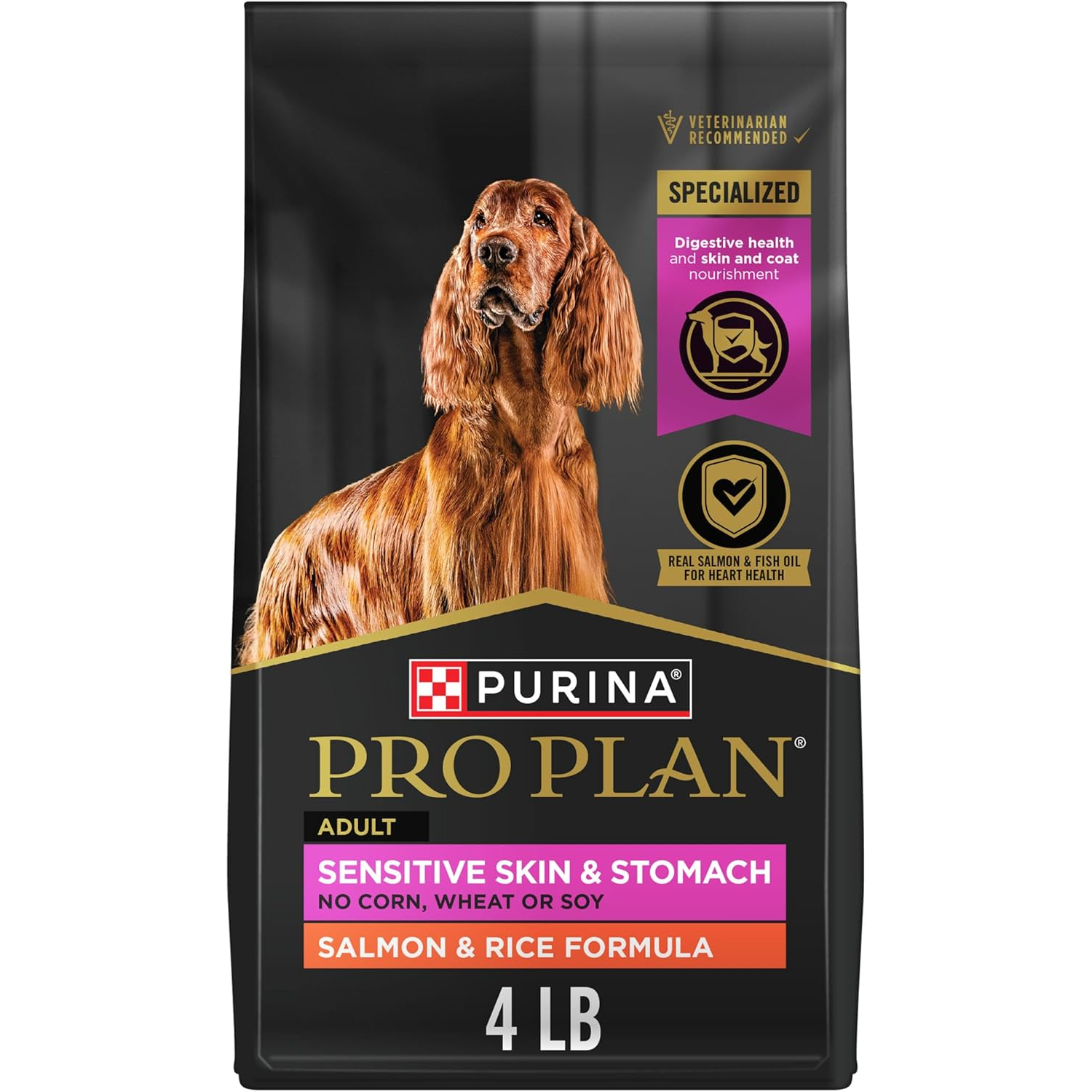
Sorry, there is no magic "stop my puppy from pooping" food, but you can help to keep them regular and avoid the aftermath of digestive distress with this kibble for sensitive stomachs. It has limited ingredients to help avoid allergens and natural prebiotic fiber to promote beneficial bacteria in their gut.
Read more below
Best puppy food overall

1. Purina Pro Plan Puppy
Our expert review:
Specifications
Reasons to buy
Reasons to avoid
Purina Pro Plan Puppy is specifically formulated for puppies in their first year, offering all the essential nutrients, vitamins, and minerals they need, along with a healthy amount of protein to help them grow up.
Purina has a variety of different flavors and formulas targeted at different breeds, including large and toy breeds, but the Pro Plan Puppy Chicken & Rice Formula is a fantastic default choice.
This puppy food is packed with protein, with chicken listed as the primary ingredient. It also contains an impressive suite of nutrients, including DHA from omega-rich fish oil to aid brain and vision development, Calcium and phosphorus to help them develop strong bones and teeth, and Omega-6 fatty acids and vitamin A to give them silky smooth skin and coat. This one gets an emphatic thumbs up from our expert vet Dr. Coder.
Best puppy food for large breeds

2. Iams Proactive Health Large Breed Puppy
Our expert review:
Specifications
Reasons to buy
Reasons to avoid
Larger dog breeds need specially formulated diets to help support their hefty frames, and that's doubly true for large breed puppies. They need the right mix of nutrients and a lot of protein to realise their potential, and that's exactly what Iams Proactive Health Large Breed Puppy delivers.
It features farm-raised chicken as the first ingredient, and a total of 28% crude protein by weight. Alongside this meaty goodness, your pup will also find 22 key nutrients like those found in their mother’s milk, including calcium, antioxidants, and omega-3 DHA to promote healthy cognition, along with natural fiber and prebiotics for healthy digestion.
It's also great value for money, and available in a variety of bag sizes to suit your needs. As a dry food, it's easy to store and serve, too, making your life easier while helping your pooch to grow up big and strong.
Best puppy food for small breeds

3. Hill’s Science Diet Puppy Small Bites
Our expert review:
Specifications
Reasons to buy
Reasons to avoid
Small dog breeds need special diets just as much as their larger cousins, and Hill’s Science Diet Puppy Small Bites is our top pick for meeting the needs of your diminutive little pup.
This kibble comes in smaller chunks, averaging between 4–6.5mm in size, which means small breed puppies like Chihuahuas and Pomeranians will be able to eat their food comfortably and safely. Beyond those tiny pieces, you're getting the same high-quality ingredients that we're recommending elsewhere in this list.
Hill’s Science Diet Puppy Small Bites is made in the USA, with chicken as the number one ingredient, providing loads of protein for building lean muscles. It also contains DHA from fish oil for healthy brain & eye development, calcium for strong bones & teeth, and Vitamin E and Omega-6 to give them smooth skin and a glossy coat. Add in prebiotic fibers to help support your pup's gut microbiome and digestive system, and this ticks all the boxes for growing pups, all wrapped up in a delicious and pint-sized-pup-friendly package.
Best puppy food for picky eaters

4. Purina Pro Plan Wet Puppy Food
Our expert review:
Specifications
Reasons to buy
Reasons to avoid
There are lots of reasons that your pup might be turning their nose up at their food. If it's causing them digestive distress or flaring up their allergies, then we'd recommend you check out Hill's Prescription Diet or Natural Balance options below. But if they truly are just being fussy, then we'd recommend trying them out on a wet food diet like Purina Pro Plan.
Puppies have preferences just like us, and a lot of dogs prefer the taste and texture of wet foods. It's more expensive and more of a pain to store, but wet food does have its advantages, too. The added liquid helps to hydrate pups who neglect their water bowls, and it also bulks out the meal to help you control their calorie intake.
Purina Pro Plan is a fantastic wet food option made with high-quality ingredients, with the primary meat as the first ingredient (It's chicken here, but there are other flavors available if your pup prefers those). There are no artificial colors, flavors, or preservatives either.
Best puppy food for sensitive stomach

5. Hill's Prescription Diet i/d Digestive Care
Our expert review:
Specifications
Reasons to buy
Reasons to avoid
If your young pooch is suffering from digestive distress, we'd highly recommend consulting with your vet because a prescription diet like Hill's Prescription Diet i/d Digestive Care could be the solution.
This kibble is formulated to be highly digestible and easy on your pet's gastrointestinal system, helping to manage digestive upsets (and the messy aftermath they cause). It's made with high-quality ingredients, including chicken as the primary protein source, along with Hill’s proprietary blend of prebiotic fibers called ActivBiome+, which rapidly activates your pup's gut microbiome to "support digestive health and well-being".
As we alluded to earlier, this kibble cannot be purchased over the counter; you need to obtain your vet's approval first, so be sure to contact them immediately if you think your puppy requires this specialized diet.
Best puppy food for allergies

6. Natural Balance Limited Ingredient Salmon & Brown Rice
Our expert review:
Specifications
Reasons to buy
Reasons to avoid
The kibble is free from the most common allergens out there, including corn, wheat, and soy. That doesn't mean this is a grain-free recipe, though, as it uses brown rice and brewers rice as key ingredients. Why does this matter? Well, as our expert vet Dr. Lisa Coder points out, grain-free diets have been associated with heart disease in young dogs.
This puppy food is packed with essential nutrients, including omega 3 & 6 to give your pooch soft skin and a shiny coat, and it's rich in fiber to help support your pup's digestive health.
On top of that, all Natural Balance Limited Ingredient kibbles use a single animal protein for their recipes, which is important for pooches with allergies to certain animal proteins. We've focused on the popular salmon option here, but there are chicken and lamb alternatives too if your pup has a specific animal protein allergy.
As is always the way with specialized products, you pay more for this puppy chow than you would for a standard alternative, but if your canine is suffering from food allergies, it's well worth the price.
Best puppy food for less poop

7. Purina Pro Plan Puppy Sensitive Skin & Stomach
Our expert review:
Specifications
Reasons to buy
Reasons to avoid
Everybody poops, and that includes your precious puppy, but if your canine is bankrupting you with poop bag expenses, then there might be something wrong with their diet. Stomach sensitivities and food allergies can be one of the key culprits here, which is why we're recommending Purina Pro Plan Puppy Sensitive Skin & Stomach.
Developed specifically to help combat digestive troubles and sensitive skin, this kibble uses lamb as the primary ingredient and contains no artificial colors, flavors, corn, wheat, or soy — all common allergens that can cause digestive issues for sensitive pups. It also contains natural prebiotic fiber, which can help nourish friendly intestinal bacteria, improving the overall health of your dog's gut biome to help improve their stool quality.
While it's free from a lot of common allergens, it does still contain oats and barley, though, so it won't be suitable for dogs with an aversion to those ingredients. There is also a different version with Salmon as the primary ingredient, if your dog prefers that flavor.
How to choose the best puppy food?
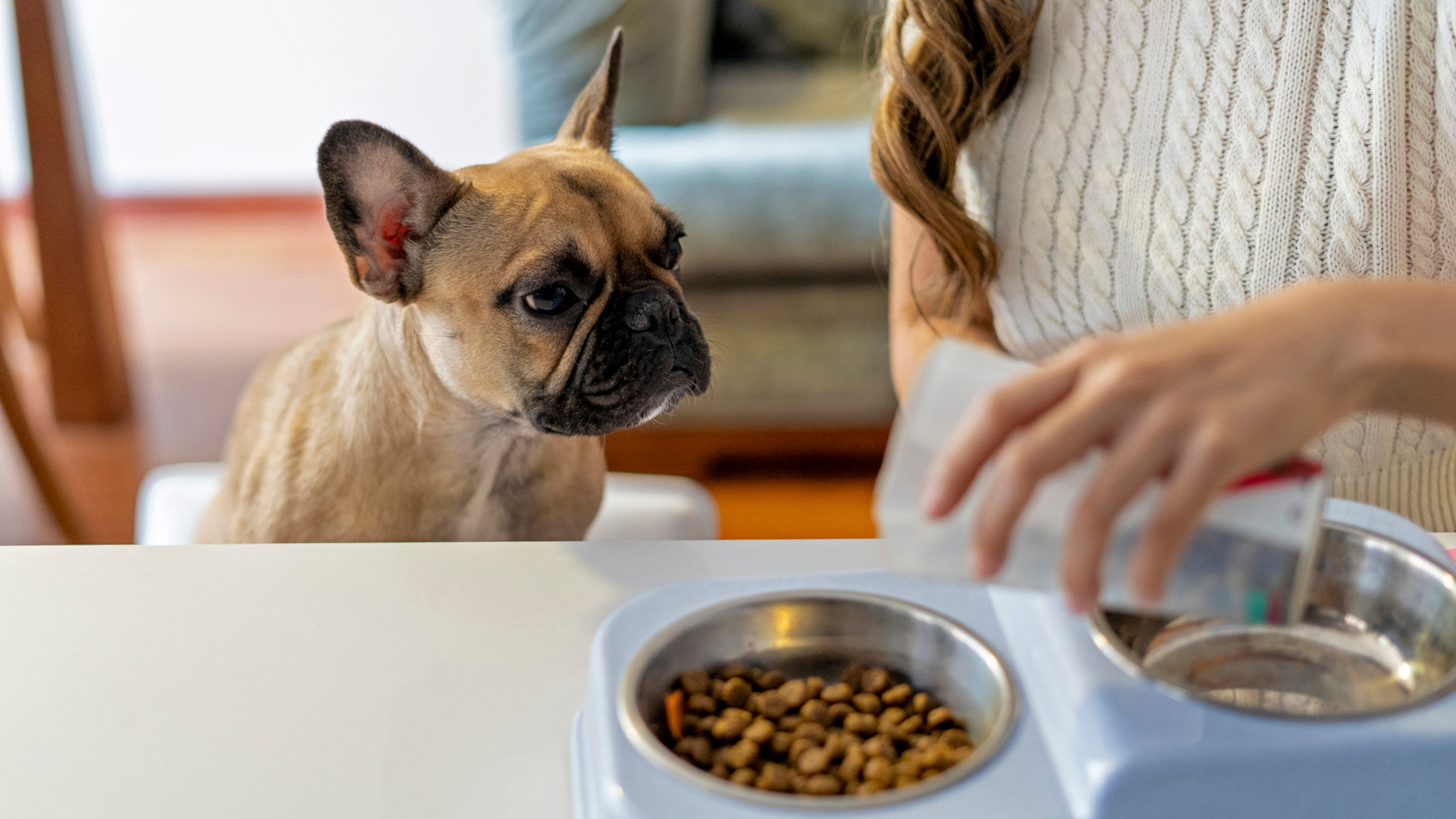
When choosing the best puppy food for your capricious canine, there are several factors you need to consider. As Dr Rebecca MacMillan explained in our best dog food guide, "There is not one perfect diet out there. Different foods may suit different dogs and their owners. You will have to select one that is not only suitable for your dog but meets your needs too, in terms of things like price and storage."
Wet food vs dry food is a common debate. Some dogs definitely prefer wet food, but it's more expensive and harder to store than dry food. There are pros and cons to both, so check out our guide if you're unsure which is right for you.
Regardless of whether you're choosing a wet or dry puppy food, there are some things you should always look out for. The best puppy foods with be made with high-quality ingredients with meat as the primary ingredient. With that said, Dr Coder warns against moving too far in the opposite direction and going completely grain-filler free.
"Grain-free diets and diets high in peas/legumes/potatoes have been associated with heart disease [dilated cardiomyopathy or DCM] in young dogs without prior genetic predisposition," explains Dr Coder. "While the exact relationship has yet to be determined, currently I never recommend a grain-free diet or a diet high in peas/legumes/potatoes for any dog or puppy."
If your dog is suffering from food allergies, it's important to consult with your vet to try to identify the allergen that is causing the issue. Once you have identified the offender (or offenders), you can look for puppy foods that exclude those ingredients. If they are allergic to a specific grain like corn or wheat, you can look for foods that use other grains like rice.
Dr Coder also has a final word on Association of American Feed Control Officials (AAFCO) statements. Many dog foods have an AAFCO standards statement that indicates that their foods have been made to AAFCO standards, but not all of them state that feeding trials have been performed.
"Feeding trials are done to observe if any health problems or nutritional deficiencies have occurred in puppies or dogs who are fed this food," explains Dr Coder. We've avoided recommending certain brands, including Orijen, Wellness Core, and Blue Buffalo – not because they're inferior, but because they state only that the diet is formulated to meet requirements, not that they have ever been evaluated with a feeding trial.
"A feeding trial using these foods would be exceptionally helpful in determining if the dramatic rise in DCM cases over the past 5–7 years is truly related to certain types of diets."
How we chose the best puppy foods
Experiencing a little déjà vu? Don't worry, we haven't accidentally copied and pasted the same thing in twice. While the above section explains how you should narrow down the options in our list, we wanted to explain how we chose those options in the first place.
We looked at a huge selection of puppy foods from all of the major brands, as well as some more niche choices that you may not have heard of. We looked at the ingredient lists, nutrient balance, and health benefits of each food and picked out several options for each category. We also looked at user review scores and testimonials, and if any of our staff have already tested a puppy food personally, then we took our own experience into account too.
From there, we consulted with our expert vet, Dr Coder, to make sure that all of our choices met with her approval. In this case, her concerns about the difference between meeting AAFCO requirements and actually having been tested against them led us to change several of our choices to ensure only the best puppy foods made it into our rankings.
Do puppies need puppy food?
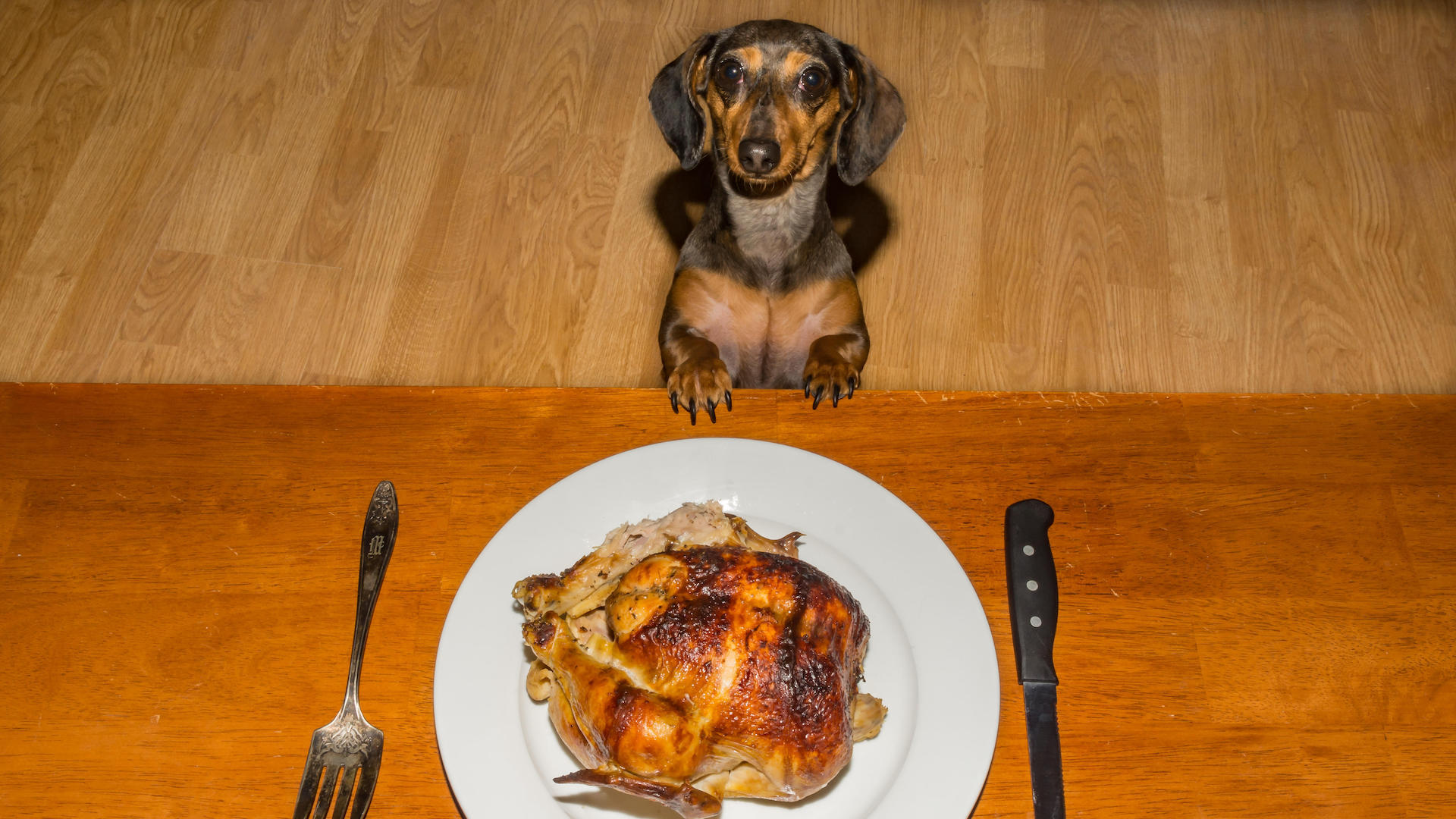
Dog food might all look the same to us humans, but there are big differences between different dog food formulas, and it's important to make sure that your pup is getting the right stuff for their needs.
"Commercially available puppy food is always best. Puppies have specific growth requirements, including for energy, balance of minerals, and other nutrients that are generally not met by adult dog food," explains Dr Coder.
You should also make sure to consider your dog's breed, too. Chihuahuas and Great Danes are very different creatures, so if your puppy is a particularly large or small breed, make sure you get a kibble formula that's designed for their stature. As Dr Coder puts it, "The more growth a puppy has to accomplish, such as in a giant breed, the more important it is to get a puppy food formulated for that breed or size."
Here’s more information on when to stop feeding puppy food and move on to adult food.
How often to feed puppies
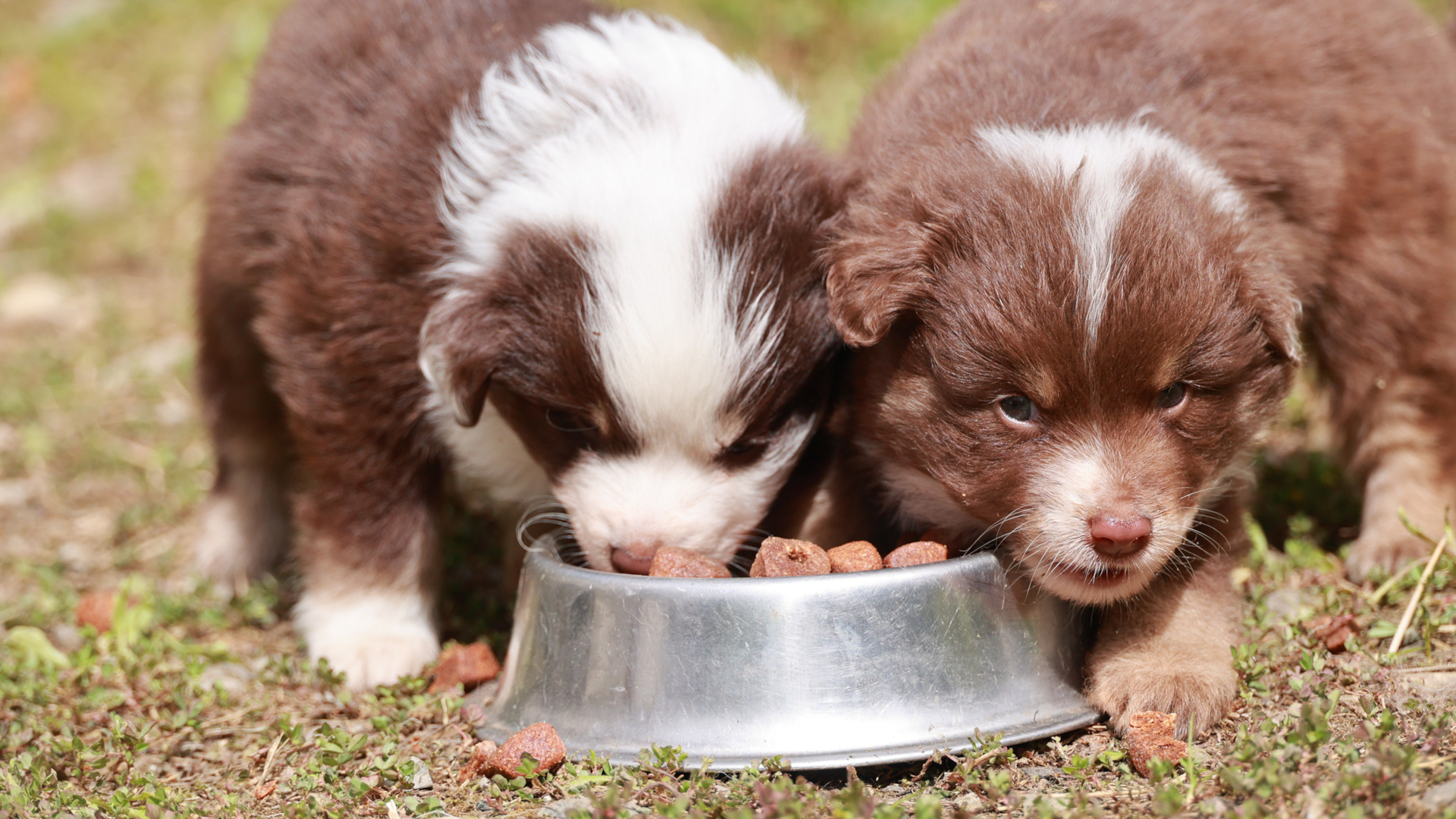
Like all dogs, puppies can be ravenous when there is food in the vicinity, but it's important to make sure they're getting the correct amount of food to support their growing bodies without overfeeding them.
"In general, puppies less than 12 weeks should be fed three or four times per day," explains Dr Coder. "After 12 weeks, twice per day is usually sufficient. Every puppy is different, and you should take into account your specific puppy and discuss their feeding schedule with your regular vet."
Read next: Best puppy treats

Dr. Lisa Coder graduated from the University of Missouri in 2013. Since then, she has worked in many different types of clinics, from equine, to mixed animal, to ER. She even served a few years with the United States Department of Agriculture as a public health veterinarian. She loves all animals and strive to provide a safe, comfortable, and compassionate place for the people and pets who make up our community family. Dr. Lisa and her practice Vital Animal Veterinary Clinic serves the greater Sioux Falls, South Dakota area, with compassionate care for cats, dogs, small exotic mammals, and reptiles. She is currently pursuing board certification in both types of exotic medicine. She has an absolutely brilliant staff, who supports her love of learning, teaching, and endeavoring to continually improve.
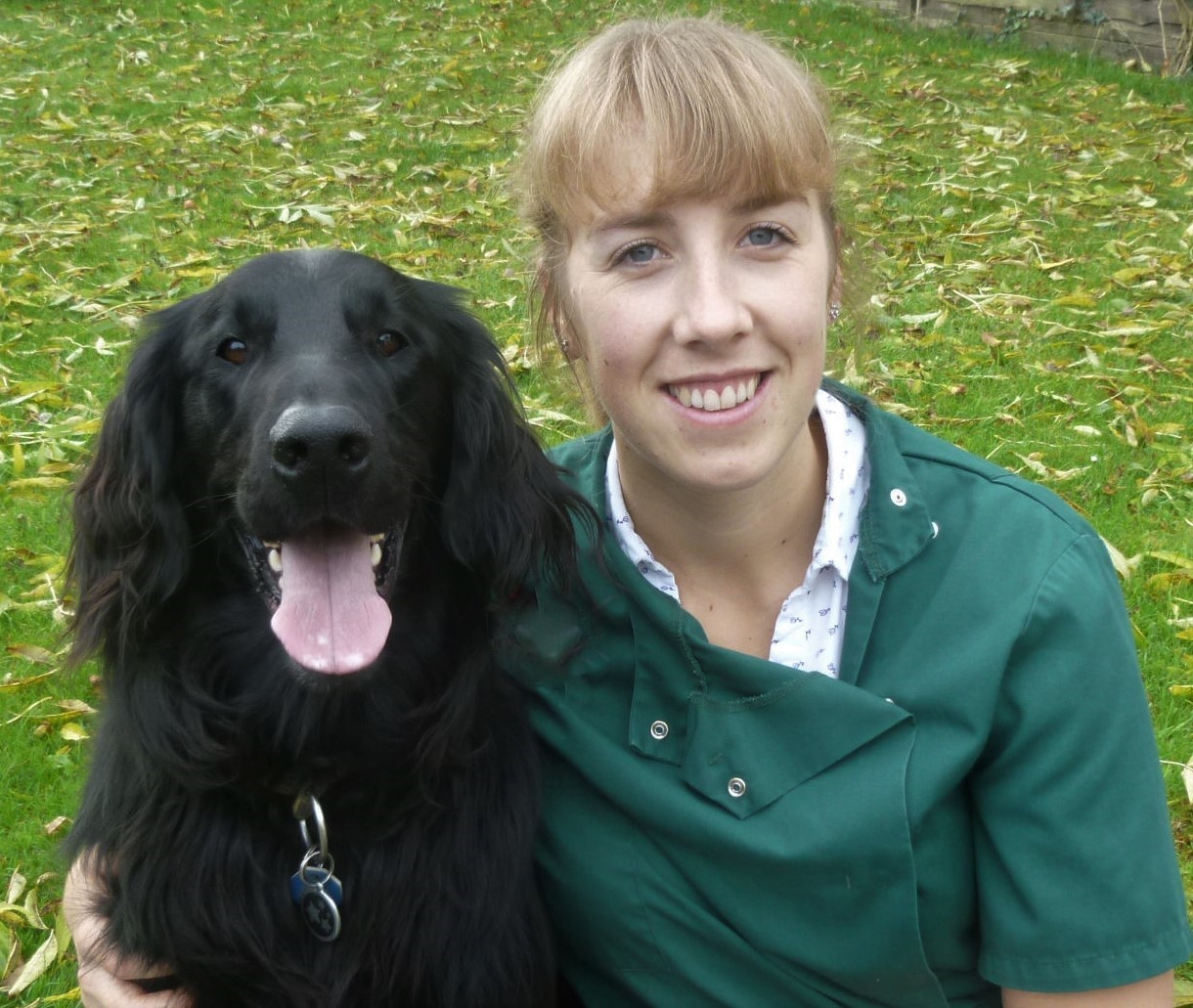
Rebecca is a veterinary surgeon who graduated in 2009 from the Royal Veterinary College in London. She has a wealth of experience in first opinion small animal practice, having done a mixture of day-to-day routine work, on-call emergency duties and managerial roles over the years. Rebecca enjoys medicine in particular and she is proud to have recently achieved a BSAVA postgraduate certificate in small animal medicine (with commendation).
She writes on various feline and canine topics, including behavior, nutrition, and health. Outside of work and writing she enjoys walking her own dog, spending time with her young family and baking!
Edited by Georgia Guerin.
We regularly review our buying guides to ensure the products are relevant, available and up to date. This page was last updated in August 2025 by Ian Stokes.
Get the best advice, tips and top tech for your beloved Pets

Ian is a freelance writer and likes to joke that he’s potentially a dog trapped in human form.
He loves animals of all shapes and sizes, and has lived with dogs, cats, chinchillas, guinea pigs, birds, fish, and even a tarantula.
Ian has more than 20 years’ of writing experience and is currently entertainment editor at PetsRadar’s sister site Space.com and has also previously been tech and entertainment editor at LiveScience.
Ian has also written for Top Ten Reviews, which makes him the perfect candidate to help guide your buying decisions as a pet owner.
Ian has a degree in biology as well as a PhD in chemistry from Keele University.
